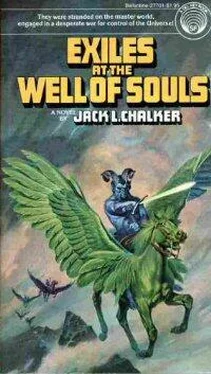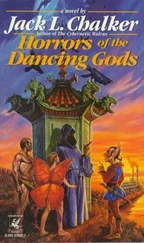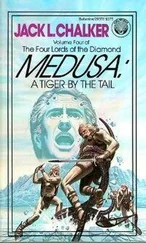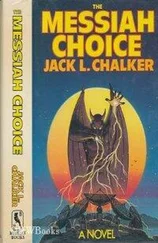Hastily, Mavra explained what had happened. The girl nodded sympathetically, but was plainly concerned.
“I don’t see how these can be cut down,” she said. “Your feet should do all right in the snow, like mine, but you should have some kind of wrapping. You haven’t got my protective skin layers and hair,” she pointed out.
“We’ll do whatever we can,” Mavra responded. “Renard will have to lead Doma once we get up there; I’ll ride her as long as possible. That should help.”
Tael was doubtful, but she was the guide, not the mission leader.
Renard went over to the door, peering out at the sky. No sign of strange or hostile creatures now; a few lazy birds, no more. But soon—who knew?
He wondered just how far off the driving forces were.
At the Palim-Gedemondas Border
The Yaxa came in for a landing with a great beating of its tremendous wings. Coming down, it saw the large number of troops and materiel now massed at the border. It looked good. Convincing.
It had been a long trip, and almost a fatal one. The creature touched the ground gently and went down on all eight tentacles toward the portable command center, a huge circuslike tent established just inside Palim. The Yaxa were born to the air; on the ground they looked awkward and lumbering, never quite properly balanced because of the long folded wings along their backs. In the air, however, they were the graceful masters.
The Yaxa entered the big tent, its huge death’s head, impassive as always, searching out someone of rank, finally spotting someone who would do over by the big situation map.
Communication between Yaxa was by a complex combination of noises from the thoracic regions and odd sounds made by antennae and slight wing rustles. Their names were untranslatable, so, when dealing with other races, they adopted nicknames that often were nonsense, ironic, or just plain crazy, and stuck to them for multiracial operations.
“Marker reporting in, Section Leader,” the newcomer said.
The section leader nodded. “Glad to see you back, Marker. We had begun to think that the enemy had gotten you.”
“It was close,” the advance scout said. “Those damned little blue men with their electricity and their flying horses. The Cebu are too clumsy to worry about, but even though the horses are slow and awkward, it only needs a touch to get you.”
The section leader knew this. She knew, in fact, as much about the physical, mental, and technological characteristics of the Makiem alliance as anyone could. The other side had had a much rougher trip than they; any force that could hammer its way through that much resistance so quickly was a force to be reckoned with.
“How far off are they?” the military commander inquired.
“Down the other side,” Marker responded. That meant at least three hundred kilometers, a good distance, and the plain that was the logical camp for the final campaign was only a hundred or so kilometers south of their present position. They would be first. “They’re a little slow with their airlift over Alestol, too. After all, they have to move everything they need a fair distance nonstop—more than either the flying horses or Cebu can normally fly. A lot of them are into exhaustion now; the ones who land soon find themselves put to sleep by those big, fat plants and then eaten. Don’t sell those Alestolians short, either—some of them have translators, would you believe, and they have a hypnotic gas as well. If one of those ones with a translator gets an Agitar or a Cebu, they’re sent back against their own people!”
The section leader chuckled dryly. “Oh, yes, I can believe that. A rather large amount was transferred in Zone to get them those translators. I’m happy to see that the expenditure is paying for itself.” The tone changed, became more businesslike. “So how soon before they have a sufficient force to start the march?”
Marker was uncertain. “Two, three days at least. And maybe two more to move up to the plain. Call it five days.”
The Yaxa leader considered this. “You’re sure? As you know, we will be moving this afternoon; we should be in and mostly established on the plain by dark tomorrow. The advance party leaves at dawn by air. With luck we can hold it while our friends go after the engines.”
“Who’s going?” Marker asked, genuinely curious. “Some of the Lamotien, of course. Who else?” She knew that nobody would trust the Lamotien by themselves. They didn’t even trust them now.
“Only Yulin can assess the engines once located,” the section leader pointed out. “So we’ll send the Dasheen up. They’re better equipped for a nontech hex and narrow trails anyway, and they’re almost as big as the Gedemondas.”
“None of us?” Marker responded, appalled. “But how will we—?”
“We removed the guidance boxes from the bridge,” the Yaxa reminded her counterpart. “We’ll control it from the other end. But, no, up there there is no protection for the wings in the cold, and snow provides little traction. I think the Dasheen and Lamotien will keep each other honest. We’ll hold the plain for them.”
“But is it safe risking Yulin like that?” Marker wondered. “I mean, he’s the whole game, isn’t he?”
“No, the engines are. The only part of the ship that can’t be duplicated. If he gets us the engines, fine. If he doesn’t, what good is he to us anyway? To tell you the truth, I wouldn’t feel a bit sorry if some of those Dasheen bulls died.”
Marker nodded sympathetically. “Their system is not a logical one, and it grates to see them treated like that.”
“Unfortunately,” the section leader sighed, “that place is really a male’s paradise. You know that scientific study they’re always throwing up at everybody to prove male superiority? Well, we made the study, and they’re right. Evolutionary-speaking, those cows are mentally and physically designed to be dull-minded, willing slaves.”
“Well, at least we have better material to send into the cold mountains than the Makiem,” Marker said, changing the subject to something more pleasant. “The Cebu could walk up there, but never fly, and they’re terrible on the ground. The Makiem grow semidormant in extreme cold, and the Agitar’s flying horses are valueless at those altitudes.”
“But those Agitar can move well,” the Yaxa commander pointed out. “And there are protective coverings for Makiem. Don’t sell them short. They’ve gotten far already. It’s going to be the roughest battle yet for both sides in a few days.”
Another Part of the Field
Antor Trelig was both confident and optimistic. The war had gone well; they were in Gedemondas, and after all they’d been through, not a single one of the soldiers, commanders, and politicians believed they could be stopped.
An Agitar general came into the command tent and bowed slightly, handing him a report. He looked at it with interest, and the Makiem equivalent of a grin spread on his face.
“Has anyone else seen this?” he asked.
The Agitar shook her goatlike head. “No, sir. From the recon man who took it to the General Staff to you.”
It was a photograph; a big black-and-white glossy. It was fuzzy and grainy, taken through a very long lens from far away, and it still wasn’t quite close enough, but it showed the most important thing.
Most of the picture was white; more had been cropped in the blow-up. But there, on a rocky ledge, was a sleek, U-shaped object reflecting the sunlight, and there were not quite legible markings on the side.
He didn’t need to read them. He knew it had a symbol of a rising sun with a human face flanked by fourteen stars, and the huge legend NH-CF-1000-1 on the side, and, in smaller letters underneath, the words PEOPLE’S VICTORY.
Читать дальше












